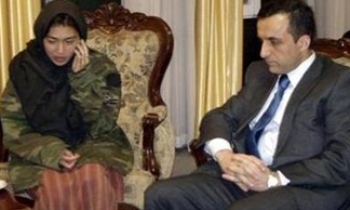Last year was the deadliest on record for working journalists since 1994.
According to the Paris-based organization Reporters Without Borders, at least 81 journalists were killed in 2006 in 21 countries.
And, at least 56 journalists were kidnapped.
I was one of them.
On Aug. 12, 2006, Fox News Channel photographer Olaf Wiig and I were heading home from our office in downtown Gaza City when our car was overtaken by masked gunmen armed with pistols and assault rifles.
The kidnappers stuffed us in their car, took us away, and held us handcuffed and blindfolded, with guns to our heads, for much of our first night in captivity.
I thought I might never see my family and friends again.
But 13 days later, after intense international and Palestinian pressure was applied, Wiig and I walked free.
In those first moments of freedom, I was videotaped, nearly in tears, hugging the first colleague I encountered at the Gaza hotel where our captors released us. E-mails poured in from around the country and around the world. People described the intense relief and joy they felt when they learned of our release Aug. 29. They told us their prayers had been answered.
These were people we had never met and never would meet. But they had become emotionally involved in our hostage drama.
Palestinian journalists and government officials, many of whom worked tirelessly for our release, were also gratified - they had publicly and firmly denounced the kidnapping as damaging and counterproductive to their cause. We all hoped a disturbing string of Gaza kidnappings had come to an end.
But it continued.
In March of this year, BBC reporter Alan Johnston was kidnapped and held for more than four months. What's worse, he was alone - forced to endure the crushing uncertainty and mental anguish of captivity without a trusted friend by his side, as I had.
Johnston, Wiig and I were simply doing our jobs - reporting the news, telling people's stories, trying to make sense of the turmoil in a troubled land.
According to research by the Committee to Protect Journalists, a New York-based advocacy group, 15 journalists have been kidnapped in Gaza since 2004. All were freed and unharmed.
But these abductions in Gaza were just part of a much larger picture. Reporters Without Borders found that at least 871 members of the media were detained around the world last year, and 129 have been imprisoned so far this year. They, too, were just doing their jobs. And some paid a very high price indeed.
The Committee to Protect Journalists reports 31 journalists have been killed in the first seven months of 2007. Reporters Without Borders puts the number at 59. This is not only a tragedy for those hardworking journalists and their families, but for the larger cause of freedom of speech, freedom of the press.
Journalists must be free to cover difficult stories in dangerous places. The riots, wars and humanitarian disasters are the visible fault lines of our society. If we don't shed light on them, we lose a vital opportunity - a chance to save lives, lift people out of poverty and build the foundations of a more peaceful world.
Journalists are the eyes and ears of the public, traveling where most people can't or won't go and providing the vital information concerned citizens need to make informed decisions. If journalists can't travel without fear of intimidation, injury or death, society as a whole suffers. The seeds of secrecy, misinformation and repression can germinate and grow.
Those who offered their moral support when Wiig and I were captured - and when Johnston endured what must have seemed to him an endless ordeal - should remain aware of the dangers to journalists.
Those who care about freedom of the press can apply pressure to any group or government that seeks to control information by capturing, injuring or threatening reporters.
Certainly, as journalists working in areas of turmoil and conflict, we accept a higher level of risk in the line of duty.
A stray bullet, a mortar landing too close, an exploding roadside bomb: All these things can - and have - killed or injured many fine reporters, producers and photographers. But being detained, kidnapped or imprisoned - being denied our basic right to move freely and report honestly - should not be part of the bargain.
My life has returned to normal. The kidnapping seems like a bump in the road - a bad situation with a happy ending. Personally, I've gotten past it. But professionally, I remain very concerned.
Journalists have become targets. The presumed white flag we wave, the cloak of protection and immunity we wear, is tattered and flapping in a cold wind. Those kind strangers who cared about our plight one year ago can pray now for the safety of journalists everywhere, especially those who continue to suffer by captivity or imprisonment for simply doing their jobs.
STEVE CENTANNI is the national correspondent for the Fox News Channel. He graduated from Los Altos High School in 1964 and San Francisco State University in 1977. He wrote this article for the Mercury News.









